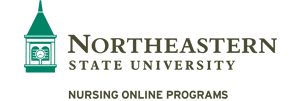Top Questions About Earning an RN to BSN Degree Online

Licensure and education are two distinct but equally important qualifications that registered nurses must have in order to practice. The minimum requirement for RN licensure is a passing score on the National Council of State Boards of Nursing (NCLEX-RN) exam and either an Associate Degree in Nursing (ADN) or a diploma in nursing. You can also earn a Bachelor of Science in Nursing (BSN) to meet the education requirement, and more nurses are choosing the BSN than ever before.
BSN-prepared RNs benefit from two years of additional training that strengthens their nursing practice and gives them a wider range of career options in healthcare. Online RN to BSN programs can help diploma- and ADN-prepared RNs earn the degree even faster through accelerated study.
If you’ve been thinking about obtaining your BSN and are curious about how RN to BSN programs work, the information below will help you learn more about your options.
What Is an RN to BSN Degree?
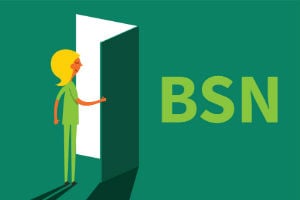
The RN to BSN is a streamlined bachelor’s degree program for RNs with an ADN or nursing diploma. It is designed for working RNs who need the BSN degree to achieve their professional goals, or to meet employer education requirements. If you want to expand your nursing knowledge, boost your earning potential or simply move up in your current nursing career, a BSN can help you do so.
RN to BSN students take upper-level courses comprising the third and fourth years of an undergraduate nursing degree and gain experience in different nursing specialties. Flexible programs such as Northeastern State University’s online RN to BSN give RNs the time and support they need to finish a bachelor’s degree as well as the option to do so at their own pace.
Do RNs Really Need a BSN?
The answer to this question depends largely on your career plans and whether you want to pursue a graduate degree someday. If you are happy with your current job and are not being asked by your employer to earn a BSN, an ADN or diploma may continue to meet your needs. Minimum education standards for RNs are changing, however, and it’s important to understand why.
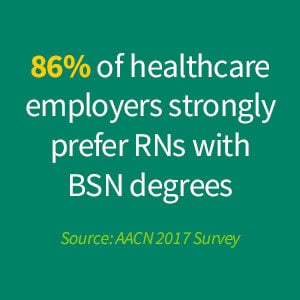
The American Association of Colleges of Nursing (AACN) now recommends the BSN for RNs due to the comprehensive range of knowledge and skills it conveys. AACN research also indicates that most healthcare employers agree on this point.
In its 2017 survey on RN employment, AACN found that 86 percent of healthcare employers express a “strong preference” for RNs with BSNs, and 49 percent require all new hires to have a BSN. RNs also need a BSN to apply to any graduate program that trains Advanced Practice Registered Nurses (APRNs), such as nurse practitioners, nurse educators and nurse administrators.
The more nursing education you have, the more options you have. Nursing is lifelong learning. Our profession has a world of opportunities.
Program Chair and Assistant Professor, NSU RN to BSN Online
What Percentage of RNs Have a BSN?
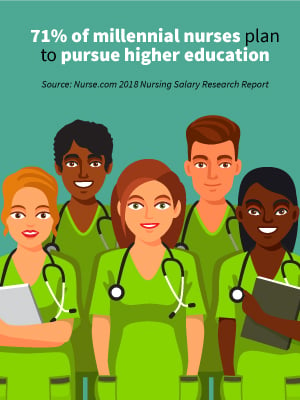
The number of American RNs with a bachelor’s degree has doubled since 1980, according to a study by Georgetown University’s nonprofit Center on Education and the Workforce, which was recently published in the American Journal of Medical Research. The study reports that half of all nurses are now BSN-prepared, in large part due to a steady increase in employer-led efforts to “upskill” diploma- and ADN-prepared RNs to BSN levels over the last decade.
Nurse.com‘s 2018 Nursing Salary Research Report found that young RNs are much more likely to choose the BSN degree over other forms of nursing education. At present, 63 percent of Millennial nurses have a BSN, compared with 35 percent of RNs from the Baby Boomer generation.
A 2018 survey of Millennial nurses conducted by AMN Healthcare revealed that this uptick in BSN graduates corresponds with the career ambitions of young RNs. Approximately 49 percent of Millennial nurses plan to become an APRN and 71 percent plan to pursue a graduate degree in nursing, each of which requires the BSN as a first step.
Nursing Preparation by Generation
| Education Level | Baby Boomers | Generation X | Generation Y/Millennials |
|---|---|---|---|
| Diploma | 11% | 3% | 1% |
| ADN | 32% | 34% | 26% |
| BSN | 35% | 47% | 63% |
What Will I Learn in an RN to BSN Program?
- Family nursing
- Community health
- Leadership
- Research

A BSN is much more than just clinical skills — it is an enhancement of communication, critical thinking and leadership skills. Nurses with a BSN have better patient outcomes.
Adjunct Instructor, NSU RN to BSN Online

You have to balance high tech and still have plenty of high touch … if we forget how to hold that patient's hand, how to comfort them, reassure them, just physically be there with them, then we've missed the mark. You've got to have both the art and the science of nursing to be successful.
Program Chair and Assistant Professor, NSU RN to BSN Online, NSU RN to BSN Online
What Kinds of Courses Will I Take to Earn the BSN Degree?
Coursework for the BSN degree focuses on the practical application of nursing theory and critical thinking skills. Meeting professional standards is also a priority. The intensive academic preparation students receive also helps ensure they are ready for graduate school if they choose to continue their education.
The NSU online RN to BSN program is composed of 30 upper-division credit hours covering the following subjects:

- Professional nursing roles and responsibilities
- Holistic health assessment
- Evidence-based nursing practice
- Cultural competency in nursing
- Family health and wellness promotion
- Care across the lifespan
- Current trends and best practices in nursing
- Ethical, legal and systemic issues in healthcare
- Nursing research fundamentals
- Community and population-based health and nursing practice
- Nursing leadership and management
Student Spotlight: Louetta Germundson
2018 graduate of NSU’s online RN to BSN program
When Louetta Germundson decided it was time to earn her BSN online after five years as an ADN RN, she got a lot of encouragement. “I feel like my employer was stoked about me going back to school,” she says, adding that her colleagues were excited for her as well. “I had positive feedback from fellow employees and leadership about my decision to go back, and ways that they’ve seen me grow.”
While studying in NSU’s RN to BSN program, Germundson also earned accolades from her professors and peers. Now that she has graduated and established a career in public health, she has fond memories of her time as an online nursing student at NSU.

The application of research and evidence-based practice is the golden difference between being a two-year RN and a four-year RN.
- Louetta Germundson
online RN to BSN graduate
“In all of the classes, there’s something that I have carried forward,” she says, and one of her favorites was NURS 4214: Nursing Leadership and Management. Germundson enjoyed exploring different management styles and perspectives, and says she took the lessons learned to heart. “It kind of made me see what type of leader I wanted to be,” she remembers.
Another favorite was NURS 4115: Community Health Nursing. In this practicum-based course, Germundson worked with a team of RNs to analyze and solve a real-world healthcare problem, just as she now does in Garfield County, Oklahoma as a public health nurse.
“The application of research and evidence-based practice is the golden difference between being a two-year RN and a four-year RN,” Germundson says. “I see where I am applying that logic and those principles to my practice as an RN, which enhances the care I provide and improves health outcomes for my patients.”
What Are the Admission Requirements?
The minimum standard for admission to most online RN to BSN programs is fairly simple.
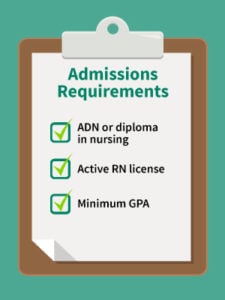
You must already have your ADN or nursing diploma as well as your RN license, and you must meet the BSN program’s minimum GPA requirement for any courses completed prior to admission. Some programs will also admit you conditionally if you are in the process of completing those requirements.
You have to meet the routine professional standards that most working RNs are used to as well, such as passing a drug screen and background check, providing evidence of American Heart Association CPR certification and nursing liability insurance, and getting up to date on your immunizations.
Be sure to check with the online RN to BSN programs you are interested in for additional admissions requirements and specific information. You can learn more about NSU’s RN to BSN admissions requirements here.
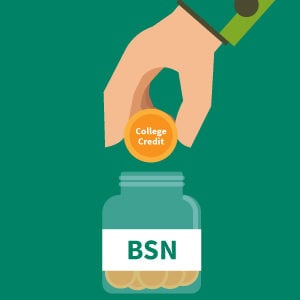 Will My Previous College Credits Transfer?
Will My Previous College Credits Transfer?
Course credits earned at an accredited school are the most likely to transfer without a problem. There can be exceptions however, especially if your prospective RN to BSN program does not offer an equivalent course to one listed on your transcript. Also, be aware that credits earned at for-profit nursing schools are not always transferrable to a new BSN program.
As you research your options, ask the admissions personnel at each of the schools you are considering to evaluate your transfer credit situation before you apply. That way you can get a better idea of how well coursework in your new program will dovetail with what you’ve already learned.
Have I Taken the Right Prerequisites for BSN Courses?
Contact an admissions advisor for any RN to BSN program you are considering if you are concerned about having to take prerequisites or leveling courses before you can begin BSN studies. Because RN to BSN programs are designed to help you move through coursework quickly, you can often take prerequisites you are missing as “corequisites” instead, meaning you complete them at the same time as BSN courses to stay on pace with your degree plan.
Do I Have to Take Statistics to Get a BSN?

If you’ve ever spent time searching the internet for an online RN to BSN degree with no math requirement, you’re not alone. Many BSN programs require nursing students to take statistics because it is relevant to nurses’ daily work.
If you have already passed a previous college-level statistics course with a grade of C or better, you may not need to take additional courses to satisfy the BSN math requirement. Check in with the online nursing programs you are considering to verify their policy.
NSU requires students to have one course (3 credit hours) in quantitative analysis. There are three courses that can satisfy this requirement: college algebra; applied math; or an advanced course in math, statistics or computer programming.
What Is the Career Outlook for BSNs?
The RN’s traditional role as a bedside caregiver, treatment team member and leader in patient care management is expanding to encompass a host of new responsibilities with the advent of new models of healthcare delivery. BSN-prepared nurses are becoming the standard bearers of this evolution in medicine, and the career outlook for BSNs is bright.

The Institute of Medicine (now known as the National Academy of Medicine) predicted today’s strong demand for BSN RNs way back in 2010 in a groundbreaking report titled “The Future of Nursing: Leading Change, Advancing Health.” The report’s authors suggested that the skills and knowledge BSN-prepared nurses bring to their work is essential to advancing quality and controlling costs in all types of healthcare facilities. They also argued that by 2020, 80 percent of nurses should hold BSNs.
This goal has since been widely adopted by public and private healthcare employers, driving demand for BSNs in a variety of care settings. As we approach the 2020 deadline, here are few reasons it’s a great time to be a BSN RN:
- Current nursing shortages in communities across the country are increasing demand for BSN RNs. In many cities and metro areas, employers are competing to attract the best nursing talent. And, salaries, bonuses and perks for BSN RNs are on the upswing.
- The U.S. Bureau of Labor Statistics predicts strong RN job growth over the next seven years, rising faster than other professions through 2026. The National Center for Health Workforce Analysis also projects that demand for RNs could grow as much as 46 percent nationally by 2030 — more than 70 percent in the states of Colorado, Utah, New Mexico, Arizona and Texas.
Why Do Employers Want Diploma and ADN RNs to Become BSN RNs?
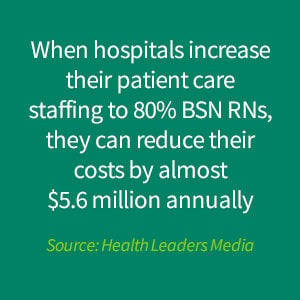
Healthcare organizations are learning through research and experience how the additional preparation the BSN provides can lead to positive outcomes for patients. Many employers have also noticed that having more BSN-prepared nurses on staff helps their bottom line.
Here are a few facts that illustrate why so many employers now prefer BSN-prepared RNs:
- Studies published in the journal Medical Care and the Journal of Nursing Administration have found that hospitals with a high percentage of RNs with BSNs have better patient outcomes, fewer readmissions and lower mortality rates. A 10 percent increase in BSN-prepared nurses actually decreases patient death rates by 10 percent, and failure to resuscitate rates by roughly 5 percent.
- To earn the Magnet designation from the American Nurses Credentialing Center (ANCC), 80 percent of the nursing workforce at a hospital, surgical center, clinic or care facility must be BSN-prepared, and 100 percent of nurse managers and nurse leaders must hold a BSN. Magnet designation signals that a healthcare organization meets high standards for nursing excellence.
- Employers consider nurses with BSNs a good investment because their enhanced skill set and experience in evidence-based practice helps cut healthcare costs. Medical industry trade publication HealthLeaders Media reports that when hospitals increase their patient care staffing to 80 percent RNs with bachelor’s degrees, they can reduce their costs by almost $5.6 million annually, even though BSN-prepared RNs earn higher salaries than other RNs.
We apply the nursing process when we're working with peers, when we're conducting research, when we're leading, when we're using evidence-based practice. It's that expanded consciousness, it's that broader perspective to look at things beyond just one nurse, one patient, one encounter, at the bedside.
- Dr. Diana Mashburn Ph.D.
Program Chair and Assistant Professor, NSU RN to BSN Online, NSU RN to BSN Online
Does an RN With a BSN Make More Money?
Additional education usually enables RNs to increase their salary; having a BSN can unlock new opportunities for pay raises, promotions or better-paying jobs. According to February 2019 salary figures published by ZipRecruiter, the average national salary for all RNs is $68,067 per year, while the average BSN salary is $82,761.
Location and demand also have a significant effect on RN compensation. The pay gap between graduates of diploma or ADN programs and BSN graduates is often wider in areas of the country where employer preference for BSN-prepared nurses is high.
A deeper dive into February 2019 ZipRecruiter salary figures for BSN RNs vs. all RNs shows the impact additional education can have on a nurse’s rate of pay:
| Average Salary by State | BSN RNs | All RNs |
|---|---|---|
| New York | $83,995 | $70,374 |
| Maryland | $78,515 | $65,769 |
| West Virginia | $77,350 | $64,830 |
| Idaho | $77,000 | $64,500 |
| Arizona | $76,087 | $63,673 |
| Nebraska | $75,946 | $63,605 |
| Connecticut | $74,987 | $62,695 |
| Pennsylvania | $73,207 | $61,318 |
| Oregon | $72,615 | $60,800 |
| Ohio | $71,233 | $59,468 |
| Colorado | $72,617 | $60,852 |
| Oklahoma | $71,547 | $59,924 |
| Georgia | $69,721 | $58,512 |
| Michigan | $67,245 | $56,129 |
| Missouri | $66,787 | $55,913 |
| Texas | $69,230 | $58,433 |
| Arkansas | $66,520 | $55,879 |
Where Are BSN RNs Most in Demand?
According to December 2018 data from Burning Glass Technologies’ Labor Insight tool, the heaviest recruiting for RNs with BSNs took place in the following cities during 2018:
- Atlanta, Georgia
- Roswell, Georgia
- Chicago, Illinois
- Naperville, Illinois
- Washington DC
- Wilmington, Delaware
- Detroit, Michigan
- Dearborn, Michigan
- Camden, New Jersey
- Newark, New Jersey
- New York, New York
- Philadelphia, Pennsylvania
- Arlington, Virginia
- Alexandria, Virginia
- Arlington, Texas
- Dallas, Texas
- Fort Worth, Texas
- Houston, Texas
- Sugar Land, Texas
- The Woodlands, Texas
Year-end data from the same technology group also shows that RN hiring was also brisk across the following states in 2018:
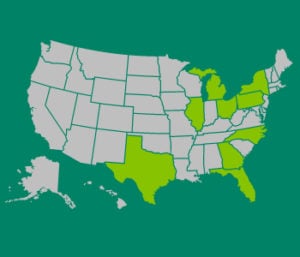
- Texas
- Florida
- New York
- Michigan
- Pennsylvania
- Georgia
- Ohio
- Illinois
- North Carolina
Where Will BSN Demand Be Highest in the Future?
Becker’s Hospital Review reports that Texas, New Jersey, South Carolina, Alaska and South Dakota will face significant RN shortages by 2030, driving strong demand for BSN-prepared RNs. The publication also notes that eight states may experience critical shortages as soon as 2025:
Projected RN shortage numbers
According to CNN, hospitals across the U.S. are already offering extensive perks such as signing bonuses, free housing and tuition reimbursement for RNs and their children as a way to attract nurses to critical shortage areas. This trend is likely to continue. BSN-prepared nurses could find great opportunity working in shortage areas for the next decade and beyond.
Do I Need a BSN to Practice In Certain States?

In December 2018, New York became the first state in the nation to pass a law called “BSN in 10” requiring new RNs to earn a BSN or higher degree within a decade of their initial licensure. The law will not take effect until 2020, however, and RNs licensed in New York before that time are exempt from the education requirement.
New Jersey and Rhode Island are considering similar legislation, and additional states are studying the issue.
What Are Some Nursing Jobs That Require a BSN?
The BSN degree is required for many different RN positions, including some great opportunities on the nursing career ladder. Here are a few examples of rewarding RN jobs in cities big and small that are available to BSN-prepared nurses:
| Position | City | Average Base Salary |
|---|---|---|
| Outpatient Clinic Manager | Denver, Colorado | $94,910 |
| RN Supervisor | Cleveland, Ohio | $91,200 |
| Clinical Informatics Coordinator | Las Vegas, Nevada | $89,189 |
| Organ Transplant Coordinator RN | Salem, Oregon | $88,700 |
| Patient Placement Coordinator RN | Orlando, Florida | $80,690 |
| Clinical Research RN | Augusta, Georgia | $75,584 |
| Senior Case Manager RN | Oklahoma City, Oklahoma | $73,750 |
| Clinical Care Quality Evaluator RN | Joplin, Missouri | $71,700 |
Are Online Programs Cheaper Than Earning My BSN On Campus?
The cost of a degree depends on several factors, including the number of course credits required to graduate, the cost per credit hour and any additional fees. Most online RN to BSN programs tend to be less expensive than those conducted on-campus because many “brick-and-mortar” costs associated with providing campus-based nursing education are no longer a factor.
Tuition for online programs at public, nonprofit colleges and universities can range from as little as $129 per credit hour to as much as $1,029, but the average cost of an online RN to BSN degree is closer to $338 per credit hour. If you completed a 30-hour RN to BSN program at that rate, your tuition would be $10,140, not including books or fees. Private institutions can be significantly more expensive, even for online degree programs.
While the example demonstrates that earning your BSN online can be quite affordable, be sure to do your homework. A degree from a program that is not accredited or one that does not have a reputation for high-quality nursing training may not be acceptable to employers no matter how cheap the tuition is. NSU’s RN to BSN program online offers excellent quality and good value, and Oklahoma residents pay only $305.50 per credit hour, including the required fees, for a total of $9,165. Out-of-state students pay just slightly more — $306.50 per credit hour for a total of $9,195.
"Having gone through the program, I feel like you get some serious bang for your buck. It's very affordable and has shaped my practice quite a bit. I got a lot out of it."
- Louetta Germundson
2018 graduate, NSU RN to BSN Online

Do Online RN to BSN Programs Let You Pay As You Go?
Most online RN to BSN programs do allow students to pay by the course. You don’t have to commit to a minimum number of credit hours each semester and then pay the large lump-sum tuition bill that comes with them.
As long as you continue to progress at a pace that makes you comfortable and allows you to do your best work, online RN to BSN programs let you fit your degree plan to your budget. Just take courses whenever it works for you financially, even if that’s just a few terms each year.
Can I Use Financial Aid to Get My RN to BSN Online?
Yes. Many RN to BSN students receive some form of financial aid while completing their nursing education, including scholarships, state funding and federal loans or grants. Be sure to complete the U.S. Department of Education’s Free Application for Federal Student Aid (FAFSA) by your school’s financial aid deadline, and contact the financial aid officer for your online program to learn more.
Can I Use My Tribal Education Benefits For a BSN Degree Online?
Yes, if you are eligible for special tuition benefits due to your Native American heritage, you should be able to apply any scholarship or grant funding you receive to your studies in an online RN to BSN program. The U.S. Bureau of Indian Education provides a list of student funding opportunities, in addition to those that may be offered by your school.
You will need your Certificate of Degree of Indian Blood (CDIB) that establishes your membership in at least one federally recognized American Indian or Alaska Native tribe to begin the application process for the tribal education funding.
Do Active Military Members and Veterans Qualify for Financial Assistance?
Yes, but the level of assistance depends on how much of your military education benefit you have used previously. Check with your branch of the service for specific information on your eligibility for education support. You must also attend an accredited nursing program to qualify.
NSU’s Office of Veterans Services works closely with RN to BSN students from every branch of the military, providing information and support on a variety of education benefit programs.
Is an Online RN to BSN Program Best for Working Nurses?
Online study is a great option for RNs who want to get a BSN degree without interrupting their nursing career. With an online degree, you don’t have to spend time commuting to school, parking, walking across campus and sitting in a classroom when you could be working, studying or spending time with family. Attending class is as simple as opening your laptop and logging into your course, and you can study whenever and however works best for you.
How Much Time Will I Need to Study?

The amount of study time you’ll need for an online BSN depends on the type and number of courses you take each term. Plan on spending 10-15 hours per week on your coursework, and adjust your effort as you go according to your needs and progress.
“Furthering your nursing education requires sacrifice, but it is a temporary one. The investment in your future will be worth it. The tassel is worth the hassle!” – Dr. Diana Mashburn, Program Chair and Assistant Professor, NSU RN to BSN Online
How Fast Can I Finish an Online RN to BSN Degree Program?
 Most online RN to BSN programs have multiple start dates during the year, and you can usually complete each course in half the time it might take on campus. Therefore, it’s possible to fulfill the degree requirements quite quickly, possibly in a year or less. Your pace can also depend on whether you have prerequisites to complete before or during your BSN coursework and whether you take any time off during your studies.
Most online RN to BSN programs have multiple start dates during the year, and you can usually complete each course in half the time it might take on campus. Therefore, it’s possible to fulfill the degree requirements quite quickly, possibly in a year or less. Your pace can also depend on whether you have prerequisites to complete before or during your BSN coursework and whether you take any time off during your studies.
Students can complete NSU’s online RN to BSN degree program in as few as 10 months.
“You can whip through [the NSU RN to BSN online] program pretty quick. Because they’re accelerated, you don’t have time to get behind. They have everything week-by-week in module content. It’s easy to follow. You know what’s expected of you.” – Louetta Germundson, RN to BSN graduate in Oklahoma
Should I Attend an Online RN to BSN Degree Program Near Me?
Unlike low-residency degree programs, which occasionally require students to come to campus, getting your RN to BSN degree online allows you to attend class literally anywhere you have internet access.
These days there is no need to limit your nursing program choices by geography. Program quality, accreditation and a good fit for your needs are the most important factors to consider, especially if you’re looking for a school that can deliver a great education at an accelerated pace.
NSU’s online RN to BSN program is available to students in 48 states.
Can My Computer Handle Online Courses?
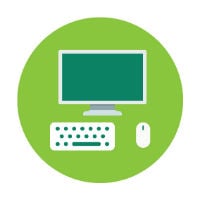
As long as your computer can handle internet surfing, chat, messaging, video streaming, word processing, spreadsheets and presentations, you should be fine.
If you’re unsure about technology requirements for any online RN to BSN degree you are considering, simply contact the program directly for further information.
How Do Clinicals Work in an Online RN to BSN Program?
In your ADN program, you had hands-on, bedside clinical rotations. Because you’ve already had those experiences, you’re not required to repeat them in an RN to BSN program. The Northeastern State online RN to BSN requires field experience hours instead of traditional clinicals. Two courses in the nursing curriculum include a field requirement: Community Health Nursing and Professional Nursing Sythesis.
How Will My Professors Teach and Work With Me Online?
Although your professors in an RN to BSN online program will not be meeting you in a lecture hall, you’ll find that they work with you in much the same way they would on campus.
You will watch video lectures, complete reading assignments, post on discussion boards, do assignments and submit them electronically, and complete quizzes, tests and presentations online. You can also meet with your professor using video chat, or stay connected by text, email or phone.
“My instructors were so understanding. They’re just an email or phone call away. They are responsive and helpful.” – Louetta Germundson, 2018 graduate, NSU RN to BSN Online

I couldn't have graduated through this program if it wasn't for the support that the instructors have given me.
- Gary Marwedel
2018 graduate, NSU RN to BSN Online
Faculty Spotlight: Dr. Diana Mashburn
Dr. Diana Mashburn, Program Chair and Assistant Professor, NSU RN to BSN Online, is a graduate of Northeastern State University’s nursing program, and she has been educating nurses at NSU for 25 years. She enjoys working with students in the online RN to BSN program and values their devotion to the field of nursing.

We're extremely flexible in terms of making ourselves available to working RNs, realizing that their schedule is 7am to 7pm, three days in a row, and they can't wait for their next day off to get an answer to a question.
- Dr. Diana Mashburn
Program Chair and Assistant Professor
Dr. Mashburn’s ongoing engagement with nurses in NSU’s online RN to BSN program gives her a unique perspective on their learning experience. She teaches in a number of subject areas, ranging from patient assessment to cultural competency, and sees her students change and develop as they expand their knowledge across the spectrum of nursing. Even if her students don’t meet in a physical classroom, she notes, she can follow their progress closely.
Dr. Mashburn believes that NSU’s focus on essential nursing practice is part of what makes graduates so successful. “We don’t necessarily have time for busy work, [we want] assignments to be able to teach something you can apply to where you’re working, where you practice nursing,” she says, “and to make things better for those patients you care for.”
“My first class, Dr. Mashburn was my instructor and so I’ve always had a lot of support from her especially, and she’s really believed in me, kept in touch with me throughout the years to make sure that I finished the program and just asked me to keep in touch.” – Gary Marwedel, online RN to BSN graduate
Will I Have Any Interaction With Classmates In Online Courses?

Of course! Students in online programs study together, even if they are not sitting side-by-side or working in virtual classroom at the same time. You can interact with your peers through discussion boards, group assignments, email and possibly even live lectures and video chats. Learning from the experience of others and sharing your own is an important part of online learning, just as it is for RNs on the job.
Just because your classmates are logging in from different cities or time zones doesn’t mean you’re alone on your RN to BSN journey. Many online students earning their BSN at NSU develop a strong connection with fellow nurses during their time in the program, not to mention professional contacts that last beyond graduation.
Are Online Nursing Instructors Academics or Experienced RNs?
Can Online Nursing Students Get Library Access?
Most online RN to BSN degree programs do provide students with remote library access to support their studies. NSU’s electronic library is a great resource that includes books, journals, databases, videos and a dedicated nursing librarian ready to assist you.
Is Tutoring or Technical Support Available to RN to BSN Students Online?

Check with any online RN to BSN program you are considering to learn more about the services it offers in this respect. Most programs do provide some form of technical assistance to students, but tutoring options can vary by school.
NSU provides free online tutoring 24 hours a day, which helps working nurses who may be studying after a late shift or at odd hours. NSU technical support is also available seven days a week by phone, email and chat.
If I Complete My RN to BSN Online, Do I Get to Walk at Graduation?
Most nursing schools with a physical campus do invite online BSN to RN students to participate in graduation ceremonies, and it’s a nice way to celebrate your achievement. It’s also a great opportunity to meet some of the nurses you have studied with online along the way.
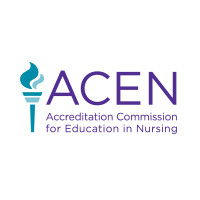
If an RN to BSN Program Is Accredited, What Does That Mean?
It means that the program has been through a comprehensive review process of its teaching and operations, and that it has been certified effective by the Commission on Collegiate Nursing Education (CCNE) or the Accreditation Commission on Education in Nursing (ACEN).
NSU nursing programs are ACEN-accredited.
What Does Accreditation Measure, and Why Is It Important?
Accredited nursing programs meet all required standards for bachelor-level nursing education, including experienced faculty, relevant technology, teaching methods and satisfactory graduation rates. Here are a few reasons that an online RN to BSN program’s accreditation status matters:
- State and federal financial aid programs require that nursing students earn their degree from an accredited program to be eligible for funding.
- Course credit earned at a college or university that is not accredited may not transfer to other schools.
- Degrees earned at unaccredited schools may not be recognized by some employers.
- Healthcare employers have more confidence in nurses who have studied in accredited RN to BSN programs because they know graduates have the right preparation for their field.
Is Regional Accreditation Important As Well?
Yes, and at the university level, regional accreditation standards are actually more rigorous than national accreditation. NSU is proud to be regionally accredited by the Higher Learning Commission.
The Commission revises and strengthens its standards for colleges and universities every five years, and its accreditors examine areas of school performance such as mission, diversity, ethics, teaching, planning and evaluation. Schools certified through the regional accreditation process have demonstrated that they provide a quality education that meets the needs of students, preparing them for career success.
